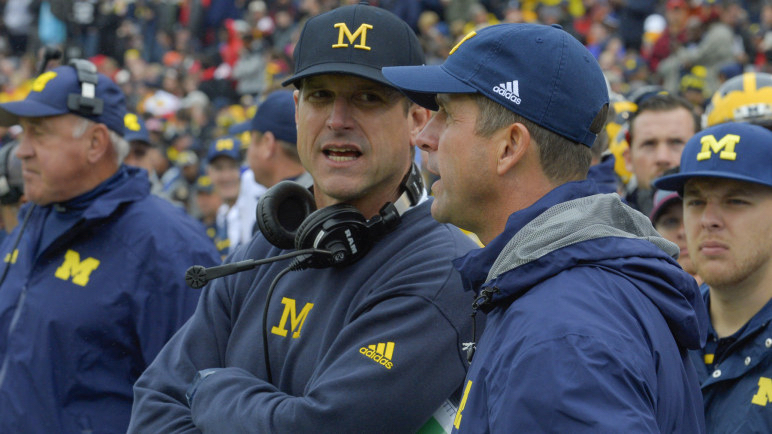U-M President defends Harbaugh’s football recruiting ethics
When University of Michigan Coach Jim Harbaugh’s staff allegedly let high school senior Erik Swenson know that the Wolverine football program was no longer into him, it might have been a crushing disappointment to Swenson. But such incidents aren’t an affront to the Ann Arbor school’s values or practices, according to U-M’s president.
In an interview this week with Bridge, his first on the subject, President Mark Schlissel offered a full-throated defense of Harbaugh and his ethics following a week in which the coach’s recruiting practices have come into question.
“I have a lot of confidence in Coach Harbaugh, and we’ve gotten to know each other quite well,” Schlissel said Wednesday. “And he looks me in the eye and says, ‘It’s no fun to win if you cheat.’ He’s very simple in that regard, and absolutely clear, and that’s one of the things that makes me think he’s going to be here for a long time and be very successful.”
In recent days, two verbal commitments to Michigan’s 2016 recruiting class ‒ Swensen, a commitment for two years, and Rashad Weaver ‒ said that after being offered a spot in the school’s recruiting class they were no longer part of U-M’s plans as National Signing Day approaches next Wednesday. Swensen spoke of receiving the silent treatment from U-M coaches in recent months before being pushed aside, presumably in favor of newer, more talented recruits.
“It is the negative, darker side of recruiting,” Tom Luginbill, ESPN’s national recruiting director, told Detroit News columnist Bob Wojnowski. “You have to make tough choices, and if you offer a kid you’re not sure you want to take, you have to deal with the ramifications” of dropping them when better recruits come along.
In his interview with Bridge, Schlissel defended the coach. Speaking generally of such recruiting controversies, he echoed an argument made by others defending the U-M program: that what’s being said and written in the media about high school recruits represents only one side of the story. He noted that Harbaugh and his staff are prevented from talking about recruits until after a player signs a letter of intent.
Schlissel also noted that there is a difference between a coaching staff making a verbal scholarship offer to a recruit and the decision by a school’s admissions office to accept that player into the freshman class.
“It’s only the University of Michigan that admits students and grants scholarships,” Schlissel said. “A coach can talk to a kid under NCAA rules a certain number of times, starting at a certain age. That’s not (the same as) being admitted to the University of Michigan."
Letters of intent are binding, but verbal commitments are not, and both player and coaches are free to vacate them before a letter of intent is signed, as many do.
The criticism follows a very successful first season for Harbaugh and his team and a fall recruiting class that is considered one of the best in the nation. It also comes amid change within U-M athletic department, with a new Athletic Director, Warde Manuel, being introduced.
Swenson, a highly regarded offensive tackle for Downers Grove South High School in suburban Chicago, appears to have been a victim of over-recruiting, where coaches make verbal commitments to more high school athletes than they can grant scholarships to under NCAA rules. It’s similar to overbooking a flight, only when boarding time comes, instead of athletes being given a voucher for another flight in exchange for giving up their promised seat, they’re told “I should reopen my recruitment and take other (college) visits,” as Swenson told the Chicago Tribune.
Swenson’s disappointment became public this month, more than two years after he’d committed to Michigan (although not initially to Harbaugh; he was recruited by then-coach Brady Hoke). He, and other players dropped later in the process, complain that with signing day Feb. 3, they have had limited time to find another top-tier school that would offer them an athletic scholarship.
Schlissel did not speak specifically about the Swenson case, saying he didn’t know the details, and didn’t want to violate NCAA rules. But he praised Harbaugh, and at the same time seemed content to leave the team’s business to the high-profile coach.
“The part of it that I’ve made my peace with,” he said, “is we don’t accept students to the University of Michigan, no matter how talented they are as an athlete, if we don’t think they can be successful here as a student, with the academic support that we can provide for them."
Michigan Education Watch
Michigan Education Watch is made possible by generous financial support from:
Subscribe to Michigan Education Watch
See what new members are saying about why they donated to Bridge Michigan:
- “In order for this information to be accurate and unbiased it must be underwritten by its readers, not by special interests.” - Larry S.
- “Not many other media sources report on the topics Bridge does.” - Susan B.
- “Your journalism is outstanding and rare these days.” - Mark S.
If you want to ensure the future of nonpartisan, nonprofit Michigan journalism, please become a member today. You, too, will be asked why you donated and maybe we'll feature your quote next time!


 Jim Harbaugh, head football coach for the University of Michigan, has faced criticism for allegedly offering verbal commitments to high school players then casting them aside when more talented players come along. (Photo courtesy MGoBlue.com)
Jim Harbaugh, head football coach for the University of Michigan, has faced criticism for allegedly offering verbal commitments to high school players then casting them aside when more talented players come along. (Photo courtesy MGoBlue.com)
